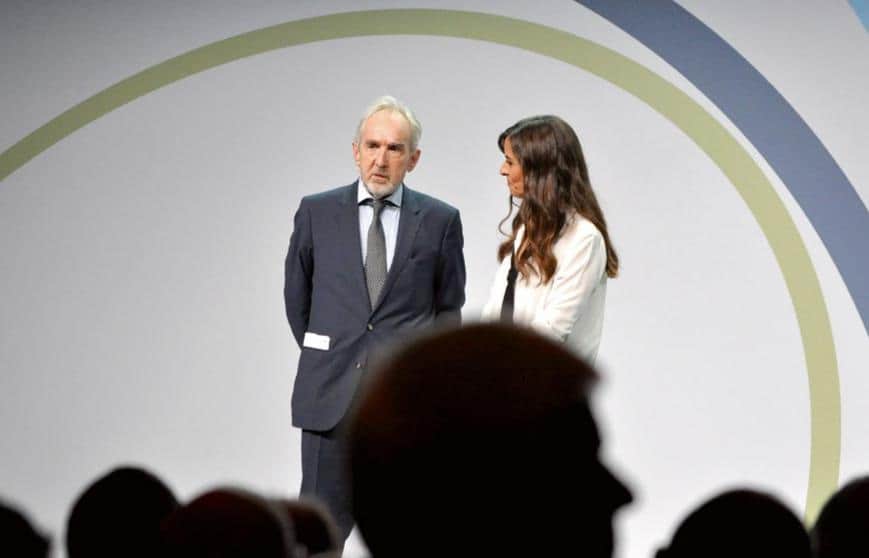That worked up an appetite!
On March 9, the ESPRIX Forum for Excellence took place at the KKL in Lucerne. Speakers such as Ludwig Hasler, Christian Methe, Rolf Huber, Gerd Leonhard, and Patrick D. Cowden provided a balanced mix of food for thought and best practice. And this year's winner was chosen from two finalists for the ESPRIX Swiss Award for Excellence.

Compared to previous years, this year's ESPRIX Forum featured a significant change. For the first time, it was no longer held in the concert hall, but in the smaller Lucerne Hall. But this in no way diminished the quality of the conference. On the contrary: with 400 participants, the number of guests was also lower than in previous years, making personal contacts among the attendees easier.
Extension of the present?
Once again, the ESPRIX Foundation as organizer succeeded in putting together an attractive panel of speakers. And the conference topic "Appetite for the future?" was also a real challenge. The philosopher and publicist Lud-wig Hasler began by expressing his thoughts, noting that it is difficult to talk about the future in Switzerland "because the present is so shiny". Current solutions to problems, which our political leaders are concerned with, are actually only aimed at "improving the present". He gave the audience three ideas to whet their appetite for the future: firstly, the future is something for the "eager"; secondly, the future needs to be discovered; and thirdly, imagination is better than knowledge when it comes to the future.
For Christian Methe, expert for digital transformation, the future has already begun. He demonstrated this directly with his "virtual conversation partner" Alexa, a voice-controlled interface to the Internet. The future belongs to voice commands and apps are increasingly being replaced by them. Christian Methe then showed the audience a kind of compass for tackling digitization in their own companies via strategy, needs and requirements clarification, data, organization and procedures. "Start now," was his concluding call.
A question of people and energy
When people talk about digitalization, the term "Industry 4.0" comes up at some point. In this respect, Rupert Hoellba-cher, plant manager at the Bosch plant in Blaichach (southern Germany), provided concrete visual lessons. He showed how Industry 4.0 works in his company, namely on the basis of networking (machines and control systems), information (is generated from collected data), and the use of data.
"Promotion is doping: it is expensive and has side effects."
data), knowledge (derivation of recommendations from information) to the highest level of maturity with predictions and automated decision-making processes. However, "Industry 4.0 without people is a waste of time," says Hoellbacher, pointing out that even at Bosch, machines cannot completely replace employees.
Another promising project was the focus of Rolf Huber's presentation. He is the founder and board member of H2 Energy AG. Together with four colleagues, he has set out to realize his vision of driving a car in a closed water cycle, completely CO2-neutral. While filling station operators and car manufacturers put obstacles in each other's way - although the hydrogen technology is available as an energy source - they took matters into their own hands: They searched for and found the right partners themselves and finally managed to set up Switzerland's first public hydrogen filling station and build a hydrogen-powered truck. And all this almost without subsidies, because "subsidies are doping: they are expensive and have side effects", as Rolf Huber summed up. Only without funding do you become really creative and innovative. And success? A pioneering achievement, carried out by a small team, which is only now beginning to cause a stir among the big players.
Creativity not replaceable
The second half of the conference focused more on the "human factor". Andreas Herz, for example, describes resilience as the fuel of successful people. Getting back up again after strokes of fate: He was able to report on this from his own painful experience. After a cancer diagnosis, he fought his way back into life. Personal training helped him a lot to be able to better endure the adversities of cancer treatment. Being able to manage oneself is a skill that managers in particular need more than ever. Andreas Herz mentioned "mindfulness" - also understood as the quality of being able to take care of oneself - as a key concept in this context.
Then it was Gerd Leonhard's turn. As a futurist, he is not a futurologist; "I don't predict anything, I just observe", is how he described the term, which is still little known in this country. In his presentation, Gerd Leonhard focused on the contrast between "Technology vs. Humanity", which is also the title of his latest book. He sees the present as the "take-off" for exponential technological change. Machines can observe, but they cannot exist," says Gerd Leonhard. Creativity and emotional intelligence are human abilities that cannot be replaced by algorithms. Routine should certainly be delegated to machines, but efficiency should never take precedence over humanity.
Finally, Patrick D. Cowden continued the thread and explained that it is not about systems and technologies, but always also about the human factor. It is this factor that has always made the decisive difference. The basis for quality lies in the willingness to cooperate. Finally, the greatest human need lies in the striving for relationships. "The future is people - and we are the alternative," Cowden concludes.
Excellence awarded
And finally, the presentation of the ESPRIX Swiss Award for Excellence was also about people and their excellence. Even though neither of the two finalists achieved the number of points required for the actual award, Noser Engineering AG was still a worthy winner (see box). Once again, it became clear that this is not a "prize for the sake of it", but an award that an organization has to earn through performance.
The Forum for Excellence was musically framed by the performances of the Lucerne chanson singer Milena. She presented - accompanied by her band - some pieces from her repertoire of original and foreign compositions. Presenter Sandra Stu-der guided the audience through the event in a confident and skilful manner, which indeed whetted their appetite for a future in which quality and excellence are likely to play a greater role than ever before. And speaking of the future: The new ESPRIX Sum-mit will take place on June 20, 2018 - the tried and tested forum will therefore undergo an "all-round renewal".









